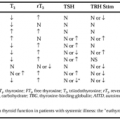MINERALOCORTICOIDS
Part of “CHAPTER 78 – CORTICOSTEROID THERAPY“
PHARMACOLOGY
Mineralocorticoids are 21-carbon steroids characterized by their effects on fluid and electrolyte balance. They promote renal sodium reabsorption and potassium excretion (see Chap. 79). Mineralocorticoid deficiency (see Chap. 81) causes hyponatremia, volume depletion, hypotension, hyperkalemia, and a hyperchloremic metabolic acidosis. Mineralocorticoid excess (see Chap. 80) is associated with the retention of sodium and water, hypertension, potassium depletion, hypokalemia, and a metabolic alkalosis. The excessive secretion or administration of a mineralocorticoid causes sodium retention, with consequent fluid retention and weight gain. Patients retain several hundred milliequivalents of sodium and gain several kilograms of weight. If mineralocorticoid excess persists, mineralocorticoid escape occurs; further sodium retention and weight gain do not
occur. During this escape phenomenon, urinary sodium excretion increases until patients come into balance, and urinary sodium excretion again reflects sodium intake. Thus, patients with mineralocorticoid excess often do not retain sufficient fluid for peripheral edema to develop (although it occasionally does) unless there is another cause for edema such as hypoalbuminemia or right ventricular failure. Therefore, the absence of edema does not exclude the possibility of mineralocorticoid excess.
occur. During this escape phenomenon, urinary sodium excretion increases until patients come into balance, and urinary sodium excretion again reflects sodium intake. Thus, patients with mineralocorticoid excess often do not retain sufficient fluid for peripheral edema to develop (although it occasionally does) unless there is another cause for edema such as hypoalbuminemia or right ventricular failure. Therefore, the absence of edema does not exclude the possibility of mineralocorticoid excess.
Aldosterone is the principal mineralocorticoid in humans. Desoxycorticosterone, corticosterone, and cortisol (hydrocortisone) also are secreted in amounts sufficient to cause salt retention in certain pathologic situations.
AGENTS USED CLINICALLY
The agents with mineralocorticoid action that are used clinically are hydrocortisone and fludrocortisone (9α-fluorohydro-cortisone, Florinef [Apothecon, a Bristol-Meyers Squibb Co., Princeton, NJ]; Fig. 78-3). When hydrocortisone is given in large dosages (e.g., 100 mg per day or more), a mineralocorticoid effect may be anticipated. Aldosterone is not used clinically, although it is a potent mineralocorticoid and is essentially devoid of glucocorticoid effect. It would be of limited value because of its brief duration of action.
Stay updated, free articles. Join our Telegram channel

Full access? Get Clinical Tree





